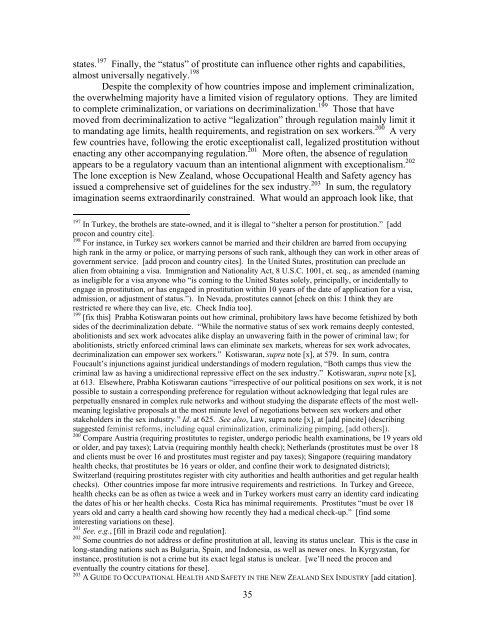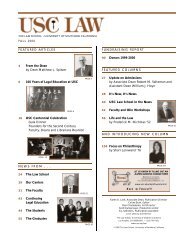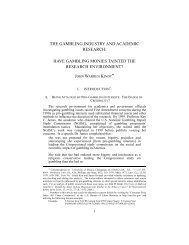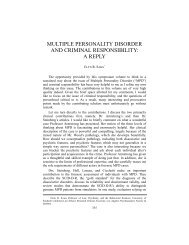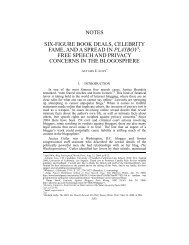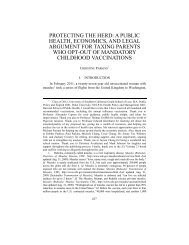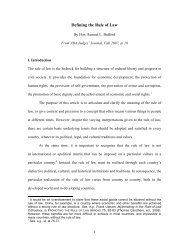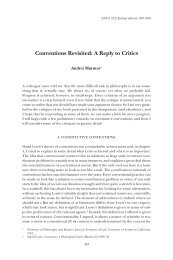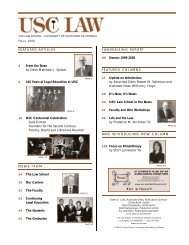1 Regulating Sex Work Adrienne D. Davis VERY ROUGH DRAFT ...
1 Regulating Sex Work Adrienne D. Davis VERY ROUGH DRAFT ...
1 Regulating Sex Work Adrienne D. Davis VERY ROUGH DRAFT ...
Create successful ePaper yourself
Turn your PDF publications into a flip-book with our unique Google optimized e-Paper software.
states. 197 Finally, the “status” of prostitute can influence other rights and capabilities,<br />
almost universally negatively. 198<br />
Despite the complexity of how countries impose and implement criminalization,<br />
the overwhelming majority have a limited vision of regulatory options. They are limited<br />
to complete criminalization, or variations on decriminalization. 199 Those that have<br />
moved from decriminalization to active “legalization” through regulation mainly limit it<br />
to mandating age limits, health requirements, and registration on sex workers. 200 A very<br />
few countries have, following the erotic exceptionalist call, legalized prostitution without<br />
enacting any other accompanying regulation. 201 More often, the absence of regulation<br />
appears to be a regulatory vacuum than an intentional alignment with exceptionalism. 202<br />
The lone exception is New Zealand, whose Occupational Health and Safety agency has<br />
issued a comprehensive set of guidelines for the sex industry. 203 In sum, the regulatory<br />
imagination seems extraordinarily constrained. What would an approach look like, that<br />
197<br />
In Turkey, the brothels are state-owned, and it is illegal to “shelter a person for prostitution.” [add<br />
procon and country cite].<br />
198<br />
For instance, in Turkey sex workers cannot be married and their children are barred from occupying<br />
high rank in the army or police, or marrying persons of such rank, although they can work in other areas of<br />
government service. [add procon and country cites]. In the United States, prostitution can preclude an<br />
alien from obtaining a visa. Immigration and Nationality Act, 8 U.S.C. 1001, et. seq., as amended (naming<br />
as ineligible for a visa anyone who “is coming to the United States solely, principally, or incidentally to<br />
engage in prostitution, or has engaged in prostitution within 10 years of the date of application for a visa,<br />
admission, or adjustment of status.”). In Nevada, prostitutes cannot [check on this: I think they are<br />
restricted re where they can live, etc. Check India too].<br />
199<br />
[fix this] Prabha Kotiswaran points out how criminal, prohibitory laws have become fetishized by both<br />
sides of the decriminalization debate. “While the normative status of sex work remains deeply contested,<br />
abolitionists and sex work advocates alike display an unwavering faith in the power of criminal law; for<br />
abolitionists, strictly enforced criminal laws can eliminate sex markets, whereas for sex work advocates,<br />
decriminalization can empower sex workers.” Kotiswaran, supra note [x], at 579. In sum, contra<br />
Foucault’s injunctions against juridical understandings of modern regulation, “Both camps thus view the<br />
criminal law as having a unidirectional repressive effect on the sex industry.” Kotiswaran, supra note [x],<br />
at 613. Elsewhere, Prabha Kotiswaran cautions “irrespective of our political positions on sex work, it is not<br />
possible to sustain a corresponding preference for regulation without acknowledging that legal rules are<br />
perpetually ensnared in complex rule networks and without studying the disparate effects of the most wellmeaning<br />
legislative proposals at the most minute level of negotiations between sex workers and other<br />
stakeholders in the sex industry.” Id. at 625. See also, Law, supra note [x], at [add pincite] (describing<br />
suggested feminist reforms, including equal criminalization, criminalizing pimping, [add others]).<br />
200<br />
Compare Austria (requiring prostitutes to register, undergo periodic health examinations, be 19 years old<br />
or older, and pay taxes); Latvia (requiring monthly health check); Netherlands (prostitutes must be over 18<br />
and clients must be over 16 and prostitutes must register and pay taxes); Singapore (requiring mandatory<br />
health checks, that prostitutes be 16 years or older, and confine their work to designated districts);<br />
Switzerland (requiring prostitutes register with city authorities and health authorities and get regular health<br />
checks). Other countries impose far more intrusive requirements and restrictions. In Turkey and Greece,<br />
health checks can be as often as twice a week and in Turkey workers must carry an identity card indicating<br />
the dates of his or her health checks. Costa Rica has minimal requirements. Prostitutes “must be over 18<br />
years old and carry a health card showing how recently they had a medical check-up.” [find some<br />
interesting variations on these].<br />
201<br />
See, e.g., [fill in Brazil code and regulation].<br />
202<br />
Some countries do not address or define prostitution at all, leaving its status unclear. This is the case in<br />
long-standing nations such as Bulgaria, Spain, and Indonesia, as well as newer ones. In Kyrgyzstan, for<br />
instance, prostitution is not a crime but its exact legal status is unclear. [we’ll need the procon and<br />
eventually the country citations for these].<br />
203<br />
A GUIDE TO OCCUPATIONAL HEALTH AND SAFETY IN THE NEW ZEALAND SEX INDUSTRY [add citation].<br />
35


